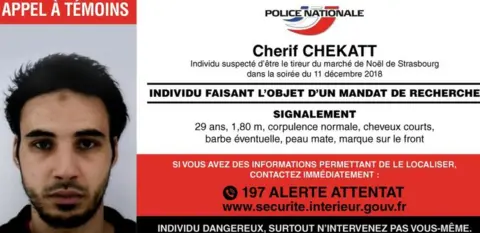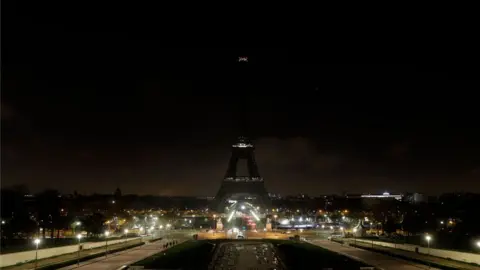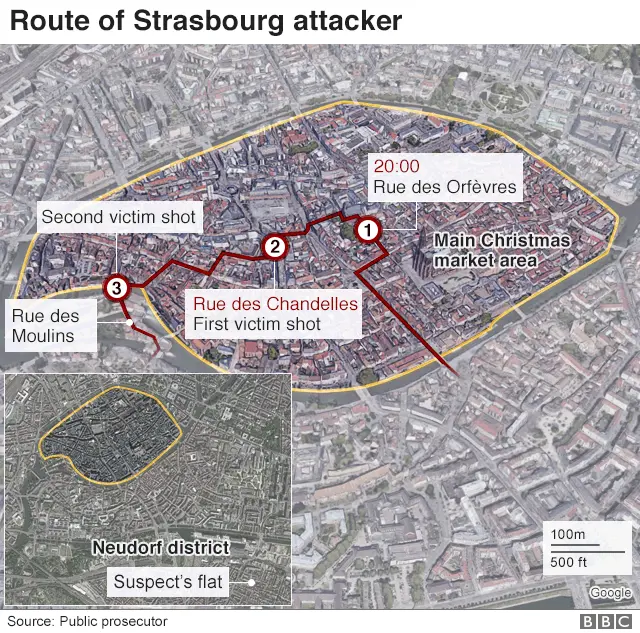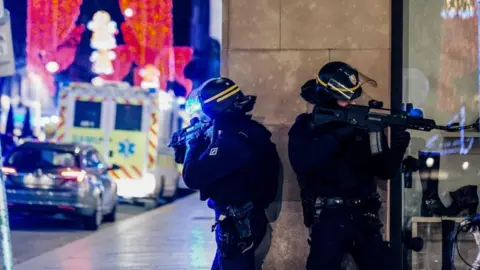Strasbourg: Police make public appeal in Cherif Chekatt manhunt
 Police Nationale (France)
Police Nationale (France)French police have appealed for help in finding a man suspected of a Christmas market gun attack in Strasbourg that killed three people, and left a fourth brain dead and 12 others wounded.
Hundreds of security personnel are searching for Cherif Chekatt, 29, on both sides of the Franco-German border.
The suspect had a string of criminal convictions and had become a radical Islamist while in prison.
Police say he is highly dangerous and should not be approached.
French officials announced on Thursday that a third person had died in the aftermath of the Strasbourg attack. Five people were seriously wounded, they said, including a man described as brain dead.
Why are searches taking place in Germany?
Chekatt has been in jail in Germany as well as France, and German reports suggested he may have received a call from Germany shortly before the Strasbourg attack. He did not answer the call, but investigators were trying to establish who was behind it, RBB Inforadio reported.
Border checks on drivers near Strasbourg brought traffic to a near standstill on Thursday
The French government and police union urged "gilets jaunes" (yellow-vest) protesters to call off demonstrations planned for Saturday to enable authorities to maintain security in the run-up to Christmas.
A 23-year-old protester was struck by a lorry and killed at a roundabout in Avignon on Wednesday night.
The lights of Paris' Eiffel Tower were turned off overnight in tribute to the victims of the Strasbourg attack. The mayor of Paris, Anne Hidalgo, said the gesture was to show the city's support to the families affected and "all of Strasbourg".
 Getty Images
Getty ImagesWho is leading the manhunt?
Interior Minister Christophe Castaner told the parliament that 720 police officers and other members of the security forces were searching for the gunman, who was injured in an exchange of fire with soldiers who were patrolling the Christmas market in Strasbourg when the attack occurred.
Across the nearby border, German police were conducting searches after France's Deputy Interior Minister, Laurent Nuñez, acknowledged that the gunman might no longer be in France.
Border agents were checking vehicles crossing the Rhine river, which marks the Franco-German frontier, leading to long lines of traffic in both directions.
Mr Castaner said the country had moved to the highest level of alert, expanding police powers and increasing vigilance. He added that security at all Christmas markets would be stepped up.
The mayor of Strasbourg, Roland Ries, has said the Christmas market there will be closed on Wednesday and Thursday, with flags lowered to half-mast at the local town hall.
How did the attack unfold?
At about 20:00 local time (19:00 GMT) on Tuesday, a man opened fire close to Strasbourg's famed Christmas market near one of the central squares, Place Kléber, which attracts thousands of visitors.
France's anti-terror prosecutor, Rémy Heitz, said the man had shouted "Allahu Akbar" ("God is greatest") as he opened fire. As well as the fatalities, 12 people were wounded, six of them seriously, he added.
The suspect was armed with a gun and a knife and escaped the area after commandeering a taxi, Mr Heitz said.
As he fled he came into contact with four soldiers, Mr Heitz said, and began firing at them. The soldiers fired back, apparently hitting him in the arm.
The attacker boasted to the taxi driver that he had killed 10 people, and also said he had been injured during a firefight with soldiers.
He ordered the taxi driver to drop him in the vicinity of the police station in the Neudorf area.

When he got out the vehicle, he fired at police officers before escaping into the night.
Four people connected to the suspect had been detained overnight in Strasbourg, Mr Heitz said. Sources close to the investigation quoted by Reuters news agency said they were the suspect's mother, father and two brothers.
What do we know about the suspect?
According to police, Cherif Chekatt was born in Strasbourg and was already known to the security services as a possible Islamist terrorist threat.
He was the subject of a "fiche S", a watchlist of people who represent a potential threat to national security.
 Getty Images
Getty ImagesHe has 27 convictions for crimes including robbery spanning France, Germany and Switzerland, and has spent considerable time in prison as a result.
Police were seeking him on Tuesday morning in connection with another case, but did not find him at home.
A search of his apartment in Neudorf revealed a grenade, a rifle, four knives - two of which were hunting knives - and ammunition.

'Weary and deflated'
By Damian Grammaticas, Strasbourg
Strasbourg's famous Christmas market is now a gloomy place.
The lines of wooden huts are all shuttered. The owner of one told us how he had to flee when he heard the gunshots and take shelter in a local bar. "We're all shaken up," he said.
At this time of year, the place should be thronged with people who come from far and wide to sightsee and shop, buying everything from hot sausages to souvenirs. Now there's a weary, deflated feeling. Police stand guard at cordoned off alleyways.
"Everyone was shouting, everyone was running, running, afraid," said one eyewitness who'd seen the gunman shooting randomly.
Strasbourg has been a target for failed terror attacks before. But now it's happened, people here are hurt and outraged. As one said: "It's shameful."

Who are the victims?
Anupong Suebsamarn, 45, a tourist from Thailand, has been named by Thai media as one of the dead. He is believed to have been on holiday with his wife.
The Italian foreign ministry has said one of the injured is an Italian journalist who was covering the European parliament, but declined to confirm media reports that he was in a serious condition.
One soldier was slightly injured by a ricocheting bullet during an exchange of fire with the gunman.
Why is Strasbourg a target?
Strasbourg has been the target of jihadist plots in the past.
Not only does it have one of France's oldest Christmas markets, but it is the official seat of the European Parliament. That parliament was in session at the time of Tuesday evening's attack.
In 2000, the Christmas market was at the centre of a failed al-Qaeda plot. Ten Islamist militants were jailed four years later for their part in the planned New Year's Eve attack.
However, MEPs were determined to carry on the morning after the attack, with German MEP Jo Leinen posting a picture of singing and Christmas lights in the European Parliament.
Allow X content?

